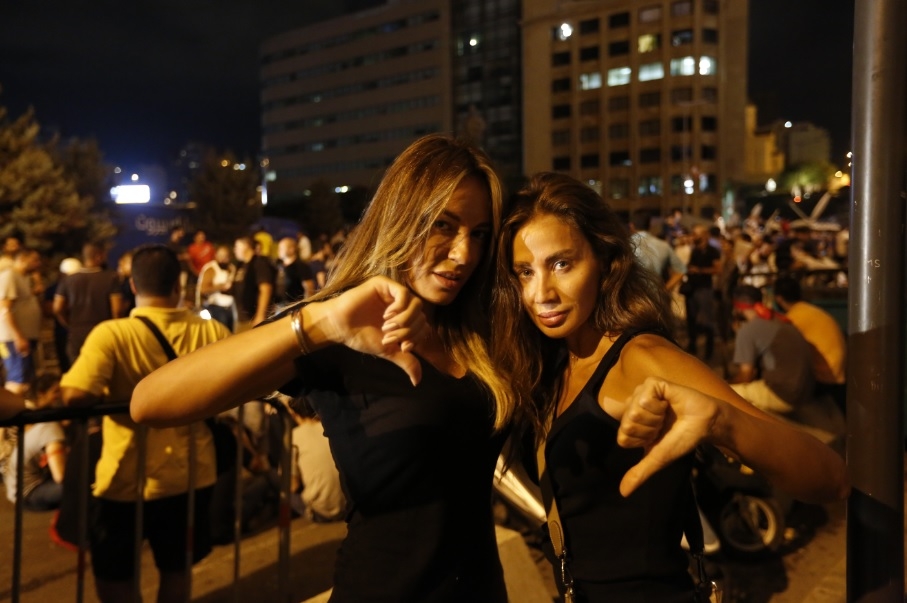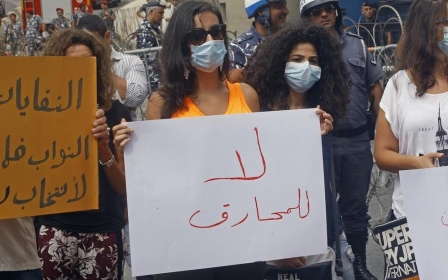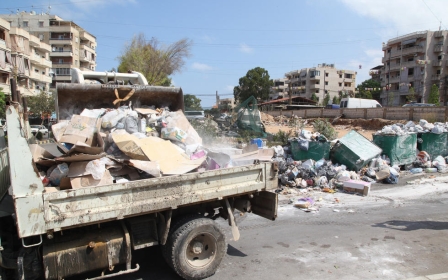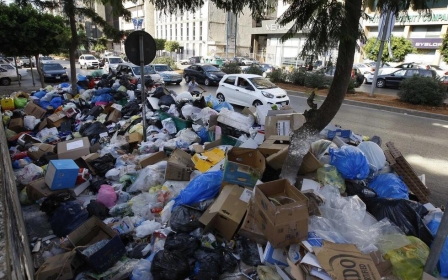Clashes erupt in 'You Stink' Beirut protest

At least 16 people were injured on Saturday when clashes erupted in central Beirut between Lebanese security forces and demonstrators calling for a solution to weeks of uncollected rubbish.
Thousands of protesters rallied to protest against the government's inability to clean up the capital and other parts of Lebanon where the streets are overflowing with rubbish.
Organised by the "You Stink" campaign, the demonstrators gathered in Riad al-Solh Square near the parliament building and chanted slogans against the government and political leaders.
Some protesters threw water bottles and firecrackers at security forces who had set up barricades and barbed wire to prevent people from approaching parliament, an AFP photographer said.
Demonstrators tried to pull down the barricades in an attempt to storm parliament and security forces retaliated with tear gas and water cannons.
Some protesters were also beaten with batons.
"There are now at least 16 people who are wounded in total," a Red Cross official told AFP, speaking on condition of anonymity.
He could not specify how many were in critical condition or what types of injuries they had sustained.
Earlier, Red Cross spokesman Iyad Munzer said at least one person was in a critical condition, and that ambulances were responding to reports of more injured.
In an online statement, Lebanon's Internal Security Forces (ISF) said "more than 35 ISF members and a number of protesters were wounded during the dispersal of the protest".
Shots were heard in the city centre, but it was not immediately clear if this was live fire, blanks, or rubber bullets.
Most of the protesters left when the demonstrations turned violent, the AFP photographer said, but hundreds regrouped in central Beirut and continued chanting.
Protest leader and activist Assaad Thebian, speaking to Lebanon's LBC news network, called on protesters to remain in Beirut's central Martyrs Square until five demonstrators who had been arrested were released.
The ISF said in a later statement that it had released all those detained during the protests following a request by Interior Minister Nuhad Mashnuq. It did not specify how many had been held.
In comments to the Al-Jadeed television network, the interior minister said he had ordered security forces to hold their fire and pledged that those who had fired on protesters "would be held accountable".
The "You Stink" campaign has staged several protests calling for a comprehensive solution to the waste problem which erupted after Lebanon's largest landfill closed on 17 July.
Since then, some municipalities have collected rubbish but then disposed of it at illegal dump sites.
'Excessive force'
Meanwhile, Lebanon's prime minister said on Sunday he was ready to meet with members of the protestors' movement, and admitted that "excessive force" had been used against demonstrators.
In a press conference, Prime Minister Tammam Salam said he stood "with the people and with the citizens."
Addressing the protesters, he said he extended his "hand to civil society. I'm ready to listen to you and sit with you."
He also pledged to hold accountable those "responsible" for using "excessive force against civil society and against the people."
"We cannot allow yesterday's events to pass without accountability and follow-up," Salam said, adding that security services "will be held accountable".
But demands posted online on Sunday by the "You Stink" campaign, which has organised recent protests, called for the government's resignation and parliamentary elections.
The group also called for the prosecution of security forces who had fired on protestors and of Interior Minister Nuhad Mashnuq.
At his press conference, Salam said the country's trash crisis was the "straw that broke the camel's back."
"But the story is bigger than this straw. This is about the political trash in this country," he said.
He called on Lebanon's cabinet to meet next week to find a solution to the crisis, railing against the political divisions that have paralysed Lebanon's government institutions.
Profound political rifts have kept Lebanon without a head of state since May 2014, leaving a caretaker cabinet -- also deeply divided -- in charge.
New MEE newsletter: Jerusalem Dispatch
Sign up to get the latest insights and analysis on Israel-Palestine, alongside Turkey Unpacked and other MEE newsletters
Middle East Eye delivers independent and unrivalled coverage and analysis of the Middle East, North Africa and beyond. To learn more about republishing this content and the associated fees, please fill out this form. More about MEE can be found here.




